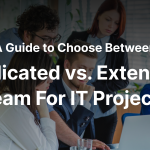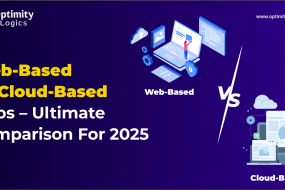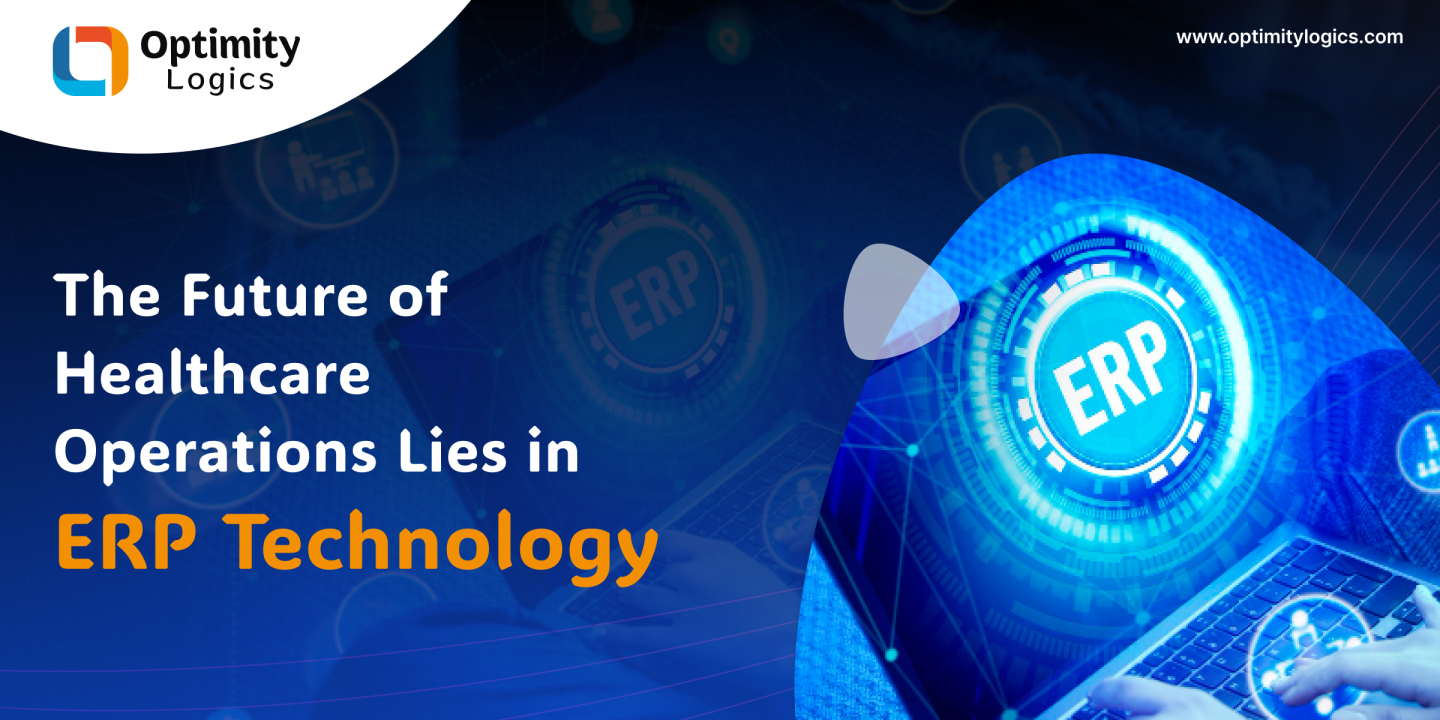
The Future of Healthcare Operations Lies in ERP Technology. Our Healthcare ERP system integrates all critical functions into a unified platform, including patient management, electronic health records (EHR), billing, inventory, and human resources.
By consolidating these operations, healthcare providers can achieve seamless communication, reduced administrative overhead. And real-time data access, ensuring a better patient and staff experience.
At Optimity Logics, we understand the complexities of managing healthcare operations. So, We offer comprehensive Healthcare ERP (Enterprise Resource Planning) solutions designed to streamline processes, enhance efficiency, & improve patient care.
Whether you’re managing a hospital, clinic, or a multi-speciality healthcare facility, Optimity Logics’ tailored ERP solutions are here to help you meet regulatory requirements, optimize resources, and stay ahead in a fast-evolving industry. So, Empower your healthcare operations with advanced technology built for precision, reliability, and growth.
Healthcare ERP System: Understanding the Concept
An ERP system is a comprehensive software solution that integrates various aspects of a healthcare organization’s daily operations, including administrative tasks, risk management, financial management, and patient care.
This advanced healthcare software helps facilities streamline operations and improve communication. So, An ERP system synchronizes facility data in real time, ensuring easy access and enabling better patient care.
Its primary goal is to maintain an optimal balance among medicine inventory, patient care, medical records, and staff schedules, fostering efficiency & excellence in healthcare delivery.
Also, The primary goal of an ERP system is to maintain an optimal balance among medicine storage, patient care, medical records. Additionally, staff schedules, ensuring seamless healthcare operations and improved outcomes.
How Does ERP in Healthcare Work?
ERP in healthcare simplifies and streamlines operations by integrating key functions like patient management, inventory control, billing, and human resources into a single, centralized system.
This platform enables real-time data sharing, ensuring seamless communication across departments and enhancing decision-making processes. Also, By automating repetitive administrative tasks and offering actionable insights, ERP systems help healthcare organizations optimize resources, improve efficiency, and focus on delivering exceptional patient care.
At Optimity Logics, our tailored Healthcare ERP solutions are designed to reduce complexities, eliminate bottlenecks, and drive better outcomes for your facility.
Areas in Healthcare Covered by an ERP system
Optimity Logics’ Healthcare ERP solutions are designed to integrate and optimize these areas, enabling healthcare facilities to operate more effectively and deliver exceptional care.
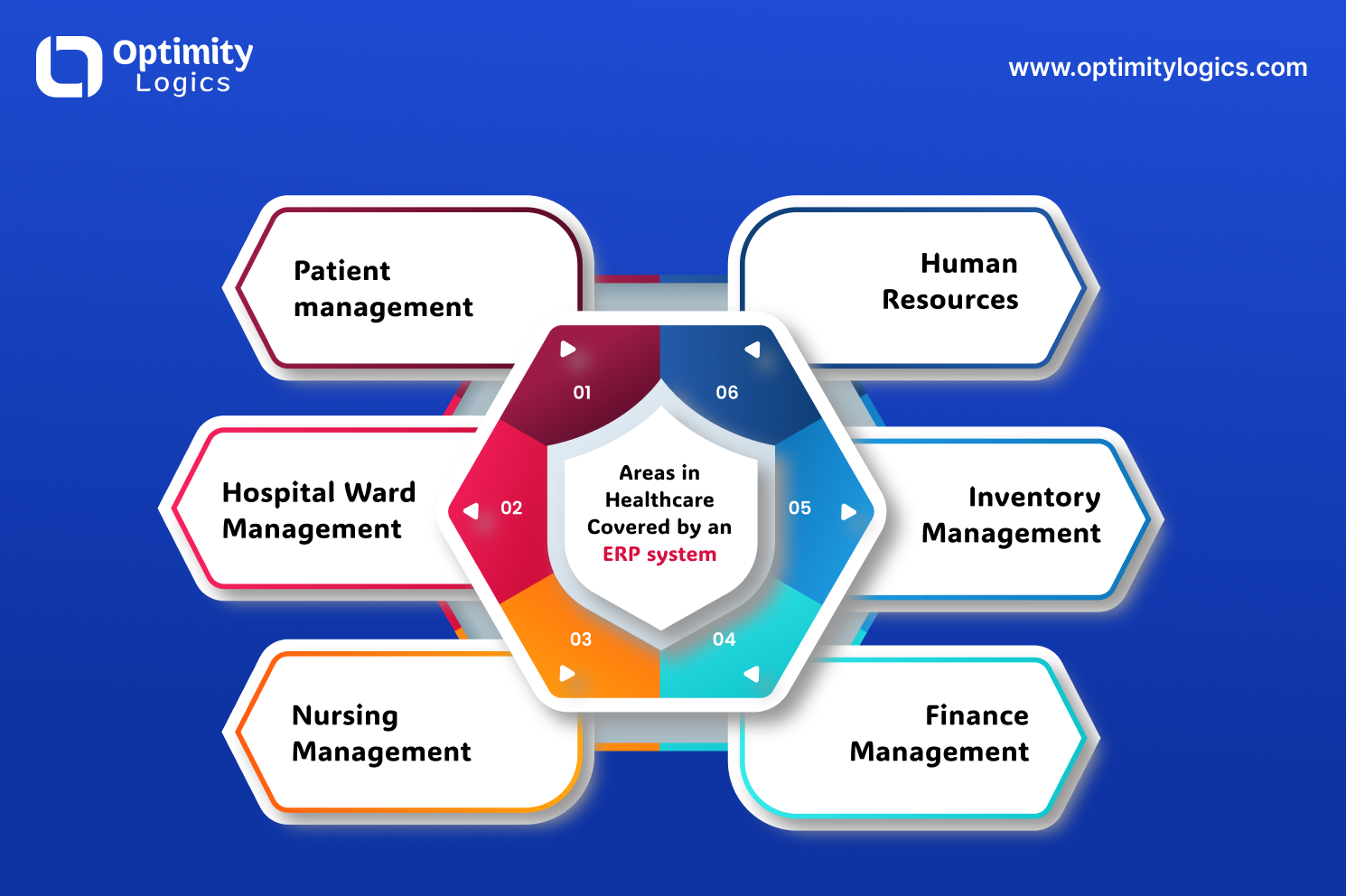
– Patient Management
Patient management is a core feature of a Healthcare ERP system, designed to simplify and optimize the handling of patient-related information and processes. So, This includes managing patient registration, appointment scheduling, medical records, and treatment plans in a centralized platform.
– Hospital Ward Management
Hospital ward management is a vital feature of a Healthcare ERP system, helping healthcare facilities efficiently manage bed allocation, patient transfers, and ward resources. Additionally, With real-time tracking of bed occupancy and availability, ERP systems facilitate smooth and efficient handling of patient admissions and discharges. Additionally, they streamline the coordination of medical staff assignments within wards, ensuring uninterrupted and high-quality patient care.
– Nursing Management
Nursing management is a crucial aspect of a Healthcare ERP system, designed to streamline the scheduling, coordination, and allocation of nursing staff. By automating tasks such as shift planning, workload distribution, and task assignments, an ERP system ensures efficient use of nursing resources while minimizing burnout.
So, With real-time access to patient information and care plans, nurses can provide personalized and timely care with greater efficiency. Also, ERP systems enhance communication between nursing staff and other departments, promoting collaboration and improving patient outcomes. At Optimity Logics, our tailored ERP solutions enable nursing teams to streamline their workflows and dedicate their attention to what truly matters—delivering outstanding patient care.
– Human Resources
Human Resources (HR) management is an integral part of a Healthcare ERP system, designed to simplify and optimize workforce operations. Also, From recruitment and onboarding to payroll, performance evaluations, and compliance tracking, an ERP system centralizes and automates these tasks, reducing manual effort and minimizing errors.
At Optimity Logics, our ERP solutions are tailored to streamline HR management, allowing healthcare organizations to prioritize exceptional patient care and operational efficiency.
– Inventory Management
Inventory management is a key feature of a Healthcare ERP system, allowing healthcare facilities to efficiently oversee medical supplies, pharmaceuticals, and equipment. So, With real-time tracking of stock levels, usage trends, and order statuses, an ERP system helps prevent shortages, minimize overstocking, and ensure timely replenishment. Also, This leads to better resource management, reduced costs, and enhanced operational efficiency.
– Finance Management
Finance management is a critical component of a Healthcare ERP system, designed to streamline and enhance the financial operations of healthcare organizations. By centralizing billing, invoicing, expense tracking, and budgeting, an ERP system ensures greater accuracy and transparency in financial reporting.
Primary Benefits of a Healthcare ERP System
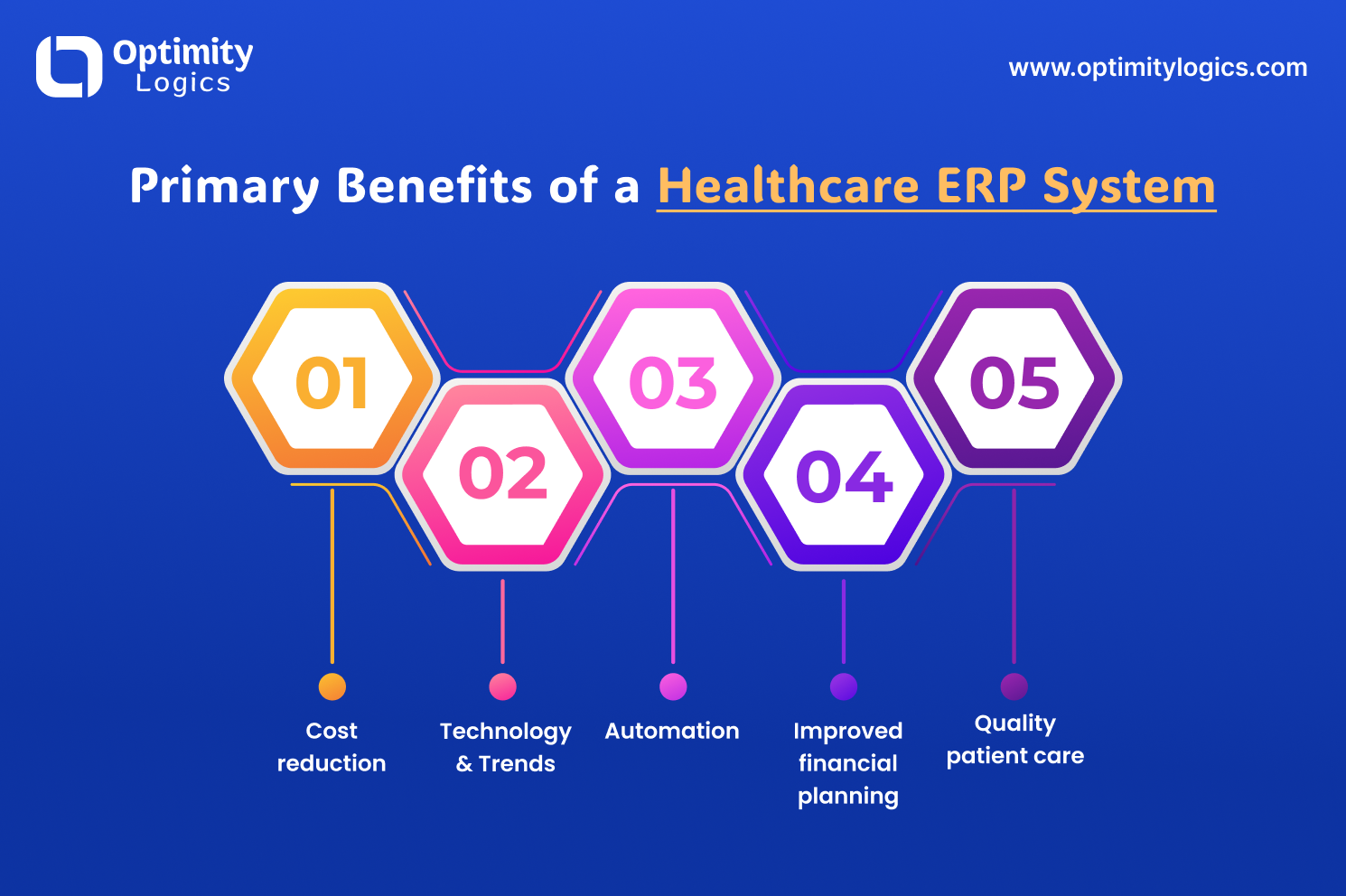
1. Cost Reduction
A Healthcare ERP system helps reduce costs by streamlining inventory management, automating administrative tasks, and optimizing resource allocation. Also, With real-time tracking and data-driven insights, ERP systems help healthcare facilities avoid overstocking, minimize waste, and simplify procurement, leading to substantial savings.
2. Technology & Trends
Healthcare ERP systems integrate the latest technologies such as AI, machine learning, and advanced data analytics. So, These innovations enable better decision-making, improve operational efficiency, and ensure that healthcare organizations stay ahead of industry trends and advancements.
3. Automation
Additionally, By automating routine tasks like billing, scheduling, and inventory management, ERP systems free up valuable time for healthcare staff to focus on delivering care. Automation also reduces human error, increases operational accuracy, and boosts overall productivity.
4. Improved Financial Planning
ERP systems provide comprehensive financial insights, enabling healthcare organizations to manage budgeting, track expenses, and forecast financial performance more effectively. Also, This ensures better financial decision-making and long-term stability.
5. Quality Patient Care
With integrated patient records, seamless data sharing, and enhanced care coordination, Healthcare ERP systems empower healthcare providers to deliver more personalized, efficient, and timely care. Also, This results in improved patient satisfaction, reduced wait times, and better health outcomes.
Benefits of switching to Cloud ERP
At Optimity Logics, our Cloud ERP solutions help healthcare organizations optimize processes, enhance data security, and support smarter, more efficient decision-making.
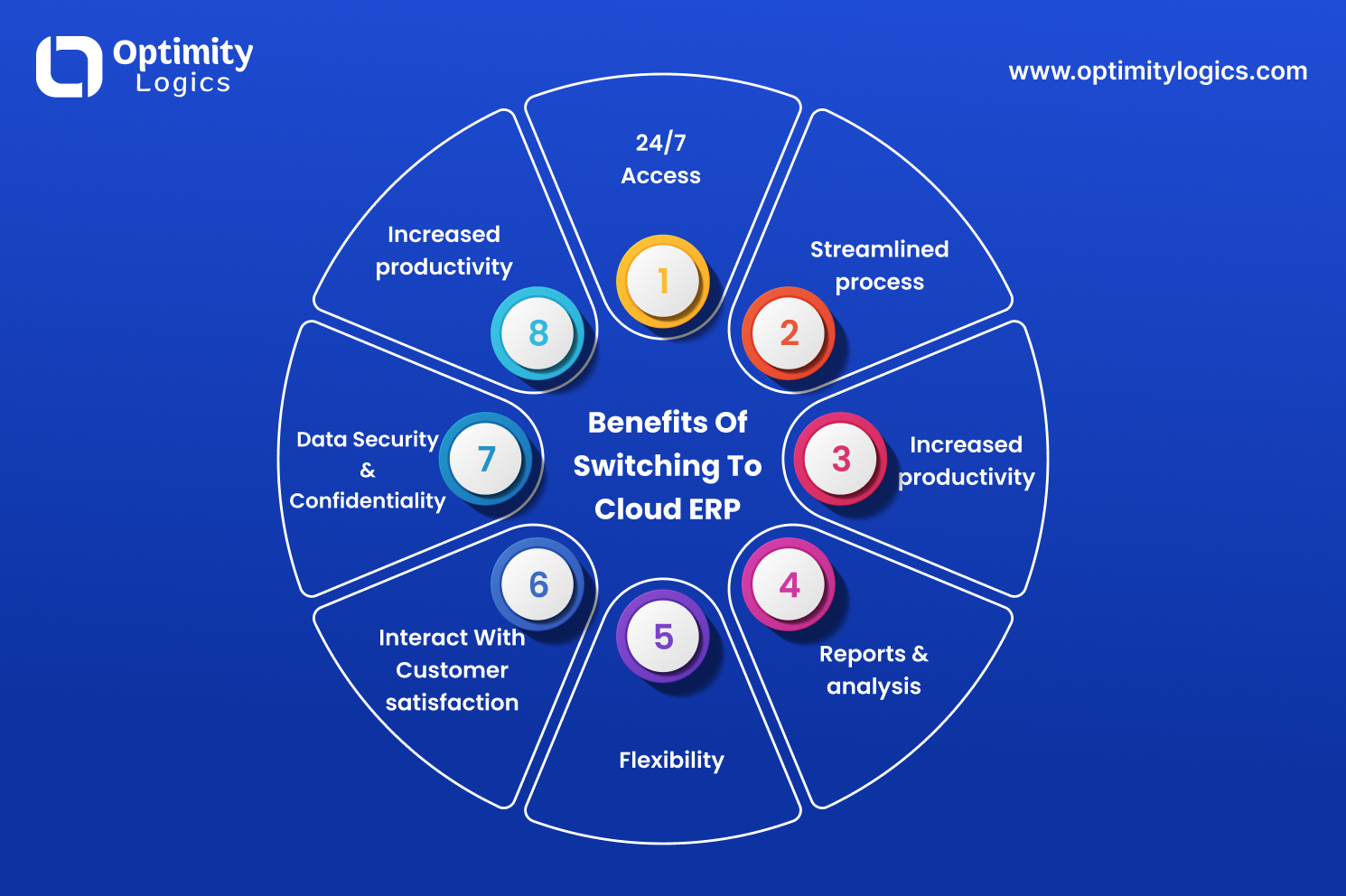
– 24/7 Access
Cloud ERP ensures seamless access to critical data and applications at any time, from anywhere, on any device. So, This constant connectivity enhances responsiveness and service delivery across healthcare organizations.
– Streamlined Processes
By centralizing key operations, Cloud ERP simplifies workflows and eliminates redundancies. Also, Automated processes and cross-department integration lead to greater efficiency, faster decision-making, and smoother operations.
– Increased Productivity
Cloud ERP boosts productivity by automating repetitive tasks like billing, scheduling, and inventory management. This allows healthcare staff to focus on patient care and other value-added activities, enhancing overall productivity.
– Reports & Analysis
Cloud ERP systems provide real-time data and robust analytics, allowing healthcare organizations to generate detailed reports and insights. Also, These capabilities enable data-driven decision-making and better strategy formulation.
– Flexibility
Cloud ERP solutions are highly adaptable and can be tailored to fit the specific needs of healthcare organizations. Whether it’s a small clinic or a large healthcare network, Cloud ERP easily scales and customizes to meet growing demands.
– Customer Satisfaction
By streamlining operations and reducing inefficiencies, Cloud ERP systems improve patient experience and satisfaction. So, Faster processes and better communication result in enhanced service delivery and stronger customer loyalty.
– Data Security & Confidentiality
Cloud ERP providers implement stringent security measures such as data encryption, regular backups, and strict access controls to ensure healthcare data is secure and compliant with regulatory standards.
– Increased Productivity
With automated workflows, real-time access to critical information, and streamlined communication, Cloud ERP systems empower staff to work more efficiently, leading to better operational outcomes and improved service quality.
Conclusion
In conclusion, adopting a Cloud ERP system brings significant advantages to healthcare organizations, such as 24/7 access to critical data, streamlined workflows, and improved productivity. By automating routine tasks, providing powerful reporting and analysis, and offering flexibility, Cloud ERP helps healthcare providers enhance operational efficiency while ensuring high levels of patient satisfaction. Furthermore, robust data security and real-time insights enable better decision-making and ensure compliance with industry standards.
At Optimity Logics, our Cloud ERP solutions are tailored to help healthcare organizations optimize their processes, reduce costs, and focus on delivering outstanding patient care. Also, Making the switch to a Cloud-based system is a strategic move for healthcare facilities looking to thrive in today’s rapidly evolving, data-driven landscape.

